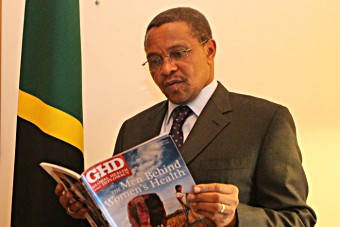
President Kikwete of Tanzania at the launch of the Global Health and Diplomacy in Davos. Photo credit: GHD/2012
Geneva, 25 January 2012 – The GAVI Alliance’s support for the HPV vaccine is a major step forward for equity and women’s health, say contributors to Global Health and Diplomacy (GHD), a new publication launched in Davos this week.
Global Health and Diplomacy
GHD provides a forum for communication, filling the existing gap in the dialogue between global health, diplomacy, development and security. Global health solutions need to be broad based and encompass all stakeholders, the publication said in a press release.
“As a board member of Global Health and Diplomacy, I support efforts that bring together multilaterals, governments, the private sector and civil society to discuss and provide solutions for our global health challenges,” said Tanzanian President Jakaya Mrisho Kikwete.
“We need diplomatic and health solutions to save lives in Africa and globally,” he said.
The announcement that the GAVI Alliance will support introduction of the HPV vaccine is an important example of how we must continue to strive for equity in health. Mary Robinson, former Chair of the GAVI Alliance Board |
Health and well-being of girls and women
The first issue of GHD highlights the importance of investments in the health and well-being of girls and women, with several articles dedicated to the issue of human papillomavirus (HPV), the virus that causes virtually all cervical cancer.
In 2008, 275,000 women died from cervical cancer, of whom 88% were in developing countries where screening and treatment were less available. In resource-constrained settings, other options are often unavailable and immunisation is key to reducing the burden of disease.
“HPV vaccines have become part of routine immunisation in many industrialised countries,” Dr Ian Frazer, creator of the HPV vaccine, wrote in the first edition. “But they are still largely unavailable in the developing world despite the high burden of cervical cancer deaths.”
HPV vaccine
In November, the GAVI Board agreed to support the HPV vaccine for women in developing countries, but said manufacturers must first offer an acceptable price and countries must demonstrate capacity to reach young women with the vaccine.
“The announcement that the GAVI Alliance will support introduction of the HPV vaccine is an important example of how we must continue to strive for equity in health,” said Mary Robinson, Ireland’s first woman president and former Chair of the GAVI Alliance Board, in an article.
By 2015, as many as two million girls in developing countries could be protected from cervical cancer.
Rwanda’s health minister, Agnes Binagwaho, said cervical cancer is by far the most common cancer among women in her country, where making the HPV vaccine available is a top priority.
“There remains much work to
do, but with the support of our partners and the will of our people, I
have no doubt that we will make it,” she said in her article for Global
Health and Diplomacy.
